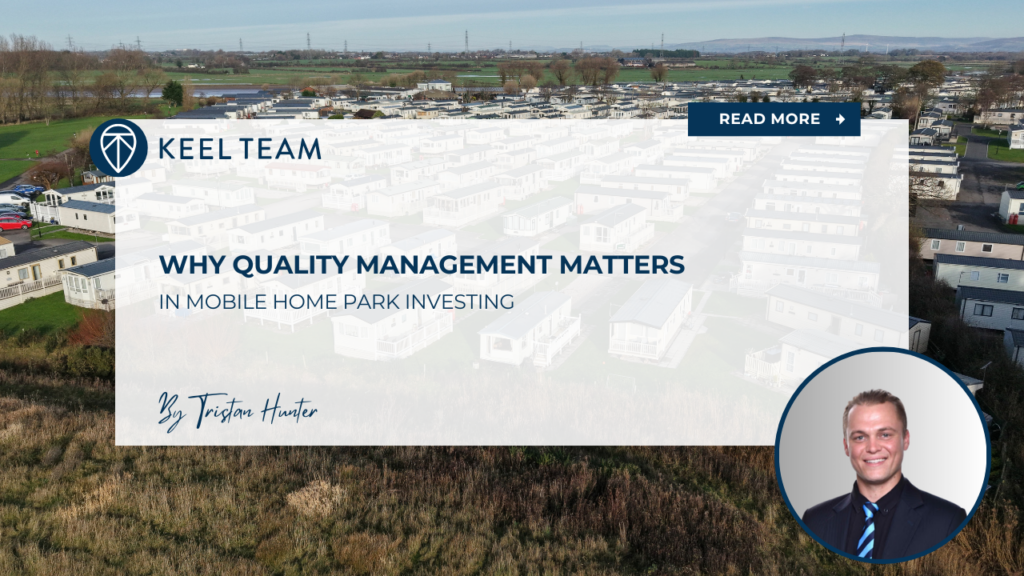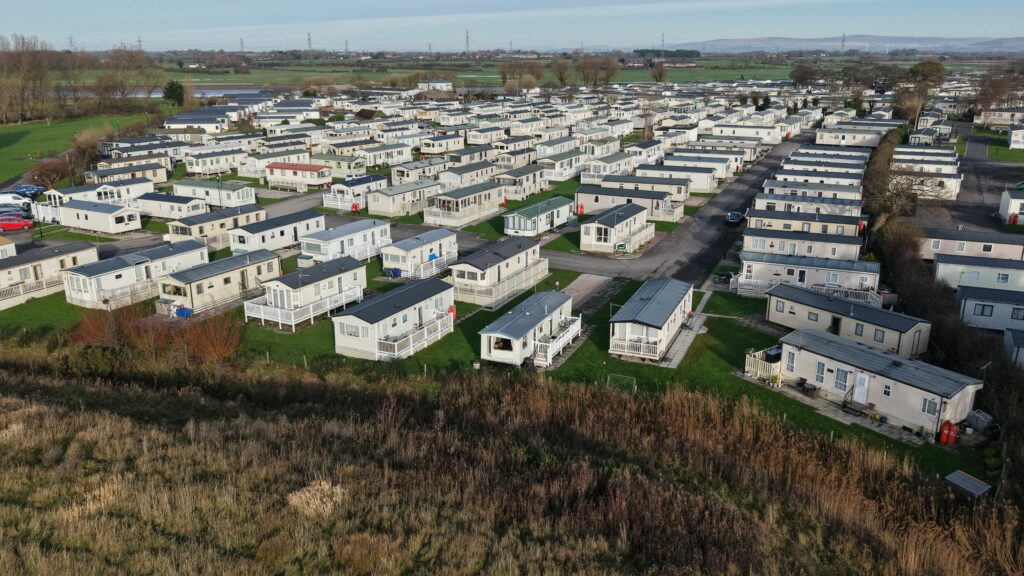Mobile Home Park Investing 101: Why Pro Management Matters
-
 Tristan Hunter - Investor Relations
Tristan Hunter - Investor Relations

Mobile home park investing can be a compelling strategy for those seeking steady cash flow and long-term returns. However, one factor often overlooked by new investors is the importance of quality management. While location and infrastructure matter, the way a mobile home park is managed often influences its long-term performance just as much, if not more.
In this article, we’ll explore how professional, resident-focused management may impact a mobile home park investment and why investors should prioritize it in their due diligence.
Mobile Home Park Management: The Missing Piece
Mobile home park investing often attracts attention because of lower costs, steady demand for affordable housing, and attractive cap rates. But without quality management, even the most promising property may face avoidable challenges.
Management is the day-to-day engine that keeps a mobile home park running. It involves handling tenant communication, enforcing rules fairly, coordinating repairs, collecting rent, overseeing capital projects, and maintaining a strong community atmosphere.
When this engine runs smoothly, investors may see fewer headaches, stronger retention, and more consistent cash flow. But when it breaks down, costs can rise, and reputation may suffer.
First Impressions Matter: Resident Experience
Good management starts with respect for the residents and the community. Residents want to feel heard, safe, and stable in their living situation. A well-managed mobile home park often reflects that through:
- Clean, maintained common areas
- Clear communication around rules and policies
- Responsive maintenance and service
- Fair enforcement of lease agreements
These elements don’t just boost resident satisfaction—they may also help reduce turnover. High turnover can increase costs due to vacancy loss, cleaning, and re-leasing efforts. Investors looking to reduce these costs might benefit from focusing on management quality.
Download our FREE eBook on the Top 20 things to know BEFORE investing in mobile home parks!
Why Poor Management Can Hurt Returns
There are many ways poor management can chip away at an investment’s potential. Here are a few key risks:
1. Increased Delinquency Rates
Without consistent rent collection processes, delinquencies can rise. This doesn’t just affect monthly income—it can also make it harder to sell or refinance the mobile home park later.
2. Deferred Maintenance
Some management teams delay repairs to save costs upfront. But in time, small issues may become expensive fixes. This can also lead to resident dissatisfaction and possible code violations.
3. Bad Reputation in the Community
Word travels fast in the affordable housing space. If a mobile home park becomes known for neglect or mismanagement, filling vacancies might become more difficult. That directly impacts NOI (Net Operating Income).
How Quality Management Can Add Value
On the flip side, quality management can contribute to long-term success in mobile home park investing. Here’s how:
1. Resident Retention
People tend to stay where they feel respected and cared for. Long-term residents provide stability, and fewer turnovers usually mean lower operational costs.
2. Consistent Cash Flow
Efficient rent collection, clear billing systems, and organized maintenance processes help improve reliability in income. While nothing is guaranteed, a well-managed mobile home park might experience fewer unexpected cash flow disruptions.
3. Improved Property Condition
Routine inspections, preventative maintenance, and resident feedback loops allow issues to be caught early. This often helps preserve the value of the asset and reduces emergency repair costs.
4. Smoother Sales or Refinancing
A buyer or lender evaluating a mobile home park will likely examine records, tenant satisfaction, and income stability. Quality management practices make these processes easier and potentially more favorable for the current owner.
What Does Quality Mobile Home Park Management Look Like?
Many investors ask, “How do I know if a mobile home park is well-managed?” While there’s no perfect checklist, here are a few signs of professional, quality management:
- Clear rules and lease agreements
- On-site or highly responsive management staff
- Proactive communication with residents
- Systemized rent collection and maintenance requests
- Evidence of capital reinvestment (repaved roads, updated signage, etc.)
- Good record-keeping and expense tracking
When evaluating a mobile home park, spend time talking to residents, reviewing documentation, and asking management how they handle challenges like late payments or disputes.

In-House vs. Third-Party Management: What Investors Should Consider
Some mobile home park investors choose to manage properties themselves, especially early on. This gives full control but requires time, organization, and experience. Others work with third-party mobile home park management companies, which can free up the investor’s time but add a recurring expense.
There’s no right answer—only what fits the goals and resources of the investor. Regardless of the route chosen, it’s helpful to prioritize systems, structure, and communication. Poor management—whether internal or external—can be just as damaging.
Aligning Management With Investment Strategy
Not all mobile home park investments are the same. Some focus on stabilized assets with minimal changes. Others involve value-add strategies with large-scale rehabs and repositioning. The style of management should reflect the investment strategy.
For example, a value-add mobile home park might require a stronger focus on tenant communication during construction phases, clear expectations, and active enforcement of new policies. Meanwhile, a stabilized asset might benefit more from preventative maintenance and community engagement.
Matching the management approach to the investment vision helps prevent misalignment and reduces confusion for residents and staff.
Final Thoughts: It’s More Than Just Operations
Mobile home park investing isn’t just about spreadsheets and cap rates. It’s about people, communities, and long-term thinking. Quality management plays a central role in balancing resident needs with investor goals.
While no investment is risk-free, having the right management in place could reduce friction and create a more stable foundation. Whether managing in-house or working with a professional team, investors may want to prioritize systems, resident respect, and proactive upkeep. These elements could ultimately influence the success or failure of a mobile home park investment.
Are you looking for MORE information? Book a 1-on-1 consultation with Andrew Keel to discuss:
- A mobile home park deal review
- Due diligence questions
- How to raise capital from investors
- Mistakes to avoid, and more!
Disclaimer:
The information provided is for informational purposes only and is not investment advice or a guarantee of any kind. We do not guarantee profitability. Make investment decisions based on your research and consult registered financial and legal professionals. We are not registered financial or legal professionals and do not provide personalized investment recommendations.

Tristan Hunter - Investor Relations
View The Previous or Next Post
Subscribe Below 👇





